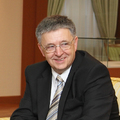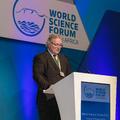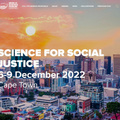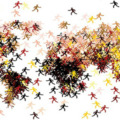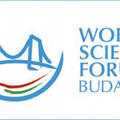World Science Forum 2011. Day 2/3 - AAAS: “Developing a coherent and compatible science enterprise"
18 November, 11:30 - 13:30 PARALLEL THEMATIC SESSION II. AAAS: “Developing a coherent and compatible science enterprise"
Chaired by: Vaughan Turekian ![[PHOTOGRAPH] Vaughan Turekian [PHOTOGRAPH] Vaughan Turekian](http://www.aaas.org/news/releases/images/turekian_200x255.jpg)
Dr. Vaughan Turekian is the Chief International Officer for the American Association for the Advancement of Science (AAAS). In this role, he leads, develops and coordinates the broad range of AAAS’s international activities. He is also the Director of AAAS’s Center for Science Diplomacy, which aims to bring together stakeholders from the scientific and foreign policy communities to identify ways to better apply science cooperation to building relationships between and among nations.
Dr. Turekian served as Special Assistant to the Under Secretary of State for Global Affairs, where he was a lead advisor on international science, technology, environment and health issues, including, clean energy, sustainable development, climate change, scientific outreach and avian influenza. He is the two-time recipient of the Department’s Superior Honor Award for his work on climate change and avian influenza.
Prior to his time at the State Department, Dr. Turekian worked at the National Academy of Sciences (NAS). In 2001, he was the Study Director for the White House-requested NAS report on climate change science. He is a member of the Council on Foreign Relations and a Nonresident Fellow in Foreign Policy at the Brookings Institution and has published a numerous articles on the linkages between science and international policy. Dr. Turekian received his master’s and doctorate in atmospheric geochemistry from the University of Virginia. He is a graduate of Yale University with degrees in geology and geophysics and international studies.
Alan I. Leshner CEO, AAAS, introductory speaker 
Bud Rock CEO, Association of Science and Technology Centers 
Mr. Anthony (Bud) Rock began his duties as the new chief executive officer of the Association of Science-Technology Centers Incorporated (ASTC) in 2009. ASTC is a nonprofit international organization of science centers and museums dedicated to furthering public engagement with science.
Mr. Rock served previously as Vice President for Global Engagement at Arizona State University (ASU), where he was responsible for expanding global awareness among students and developing new and creative international programs of research and scholarship. Before joining ASU, Mr. Rock had a distinguished three-decade career in the U.S. government service, much of it within the U.S. Department of State promoting scientific and technological collaboration throughout the world. His diplomatic service culminated in his five-year appointment as acting assistant secretary and principal deputy assistant secretary of state responsible for oceans, environment, and science.
Mr. Rock served abroad as Minister for Science, Technology, Environment, Health, and Non-Proliferation Affairs in the United States Embassy in Paris, France; was the Counselor for Environment, Science, Technology, and Health at the United States Mission to the European Union in Brussels, Belgium; and was Counselor for Environment, Science, Technology, and Health at the United States Embassy in Tel Aviv, Israel. Mr. Rock also held positions in the Office of the United States Trade Representative, Executive Office of the President, as Director for European Technology and Trade Affairs and as Director of Middle East Trade Affairs. In the Department of State, Mr. Rock served as Chief of Policy Planning in the Bureau of Oceans and International Environmental and Scientific Affairs (OES); Chief for International Health Policy and Chief of International Technology Policy.
Prior to his diplomatic service, Mr. Rock was employed by the National Oceanic and Atmospheric Administration (NOAA) of the U.S. Department of Commerce.
Julie Maxton,
Executive Director, Royal Society
Dr Julie Maxton is the Executive Director of the Royal Society. She took up her post in March 2011.
Dr Maxton is the first woman to hold the post in the history of the society. She was previously Professor of Law, Dean of the Law Faculty and Deputy Vice Chancellor of the University of Auckland and then Registrar of the University of Oxford.
Tateo Arimoto, Director General, RISTEX; Deputy Director General, CRDS Japan Science and Technology Agency 
Mr. Arimoto graduated from Kyoto University (Graduate School of Science) in 1974. He has a master’s degree in physical chemistry. He served as Director, Planning, Policy Division, Science and Technology Policy Bureau, Science and Technology Agency, Japanese Government (STA) (1987); Director, National Space Development Agency of Japan (NASDA), Los Angeles Office (1989); Director, Science and Technology Information Division, STA (1992); Director, Planning Department, Japan Marine Science and Technology Center (1994); Director, Radioactive Waste Policy Division, Atomic Energy Bureau, STA (1996); Director, Department of Public Communications, Japan Atomic Energy Research Institute (1998); Director, Policy Division, STA (1999); Director, Research Promotion Division, RIKEN Yokohama Institute (2000); Deputy Director General for Science and Technology Policy, Cabinet Office (2001); Deputy Director-General, Lifelong Learning Policy Bureau, Ministry of Education, Culture, Sports, Science and Technology (MEXT) (2002); Director-General, Science and Technology Policy Bureau, MEXT (2004); Executive Research Fellow, Economic and Social Research Institute, Cabinet Office (2005). Mr. Arimoto currently serves as Director General,Research Institute of Science and Technology for Society (RISTEX) and serves for Japan Science and Technology Agency(JST).
Video: World Science Forum 2009 - Science Funding and the Post-Crisis World
Patrick Cunningham - Chief Science Adviser to the Irish Government
Patrick Cunningham is Professor of Animal Genetics at Trinity College, Dublin. Originally from Waterford, he graduated from UCD in 1956 with first class honours in Agricultural Science.
Professor Cunningham’s work in An Foras Talúntais focused mainly on genetic improvement in the Irish cattle population. He pioneered methods of genetic evaluation, introduction and assessment of new breeds and strains, and the economic evaluation of breeding options and strategies. The theoretical work which accompanied this research attracted considerable international attention.
In 1964, Professor Cunningham began to contribute to the newly-established Department of Genetics in TCD, and in 1974, he was appointed Professor of Animal Genetics. In 1988, he moved to the World Bank as visiting professor at the Economic Development Institute. From 1990 to 1993, he was appointed Director of Animal Production and Health at the Food and Agricultural Organisation (FAO) of the UN in Rome. During this period also directed the Screwworm Eradication Programme for North Africa, the largest international campaign of biological control ever undertaken.
On his return from the World Bank in 1989, he initiated a new programme of research in TCD. This was based on the use of newly-developed methods of reading DNA to measure genetic diversity and plan livestock improvement in developing countries. The first results of this work, emerging in the early 1990s, rewrote the history of animal domestication, demonstrating for the first time the separate domestication of cattle in India on the one hand and in Africa and Europe on the other. This work has since been expanded by Professor Cunningham and his colleagues to other species including horses, salmon and humans, placing Irish research at the forefront of international work in this area.
Following the BSE crisis in 1996, Professor Cunningham and his colleagues developed a system of DNA traceability for the meat industry, which has been used successfully in Europe for some years. They went on to establish a biotechnology company IdentiGEN, which deploys these technologies in Europe and the USA. Professor Cunningham is the Chairman of IdentiGEN.
Professor Cunningham’s work has been published in some 100 papers in refereed journals, and has twice featured on the cover of Nature.
Professor Cunningham took up his post as Chief Scientific Adviser to the Government in January 2007. Professor Cunningham is responsible, via the Interdepartmental Committee for Science Technology and Innovation (STI), to the Cabinet Sub-Committee on STI, and works with the range of implementation and oversight structures being established to advance the recently-published Strategy for STI (SSTI 2006-2013).
Cathleen A. Campbell, CRDF 
Cathleen A. Campbell was appointed CRDF Global President and CEO in April 2006. She oversees 150 staff implementing innovative science and technology programs in over 30 countries.
Ms. Campbell joined CRDF Global in 2002 as vice president for programs, overseeing the organization’s five program departments, and was appointed senior vice president in 2003. Campbell brings to CRDF Global three decades of international science and technology policy and program management experience. She has worked with and traveled extensively to countries in Eurasia, the Middle East, East Asia and Latin America.
Prior to joining CRDF Global, Campbell served from 1998 to 2002 as director of the Office of International Policy and Programs in the Technology Administration of the Department of Commerce, as well as executive director of the U.S.-Israel Science and Technology Commission. From 1995 to 1997, she was a senior policy analyst in the White House Office of Science and Technology Policy (OSTP). Campbell was the U.S. State Department’s program officer for Soviet/Russia science and technology affairs from 1989 to 1994.
Campbell serves as a member of the External Advisory Board of the Pennsylvania State University’s School of International Affairs; the U.S.-Russia Innovation Council on High Technologies; the Advisory Board of the Muslim Science and Technology Heritage Awareness Group of the Foundation for Science, Technology and Civilization, Inc; and the Board of Directors of Global TechInnovations, a technology investment and professional services company in Moscow, Russia. She holds an M.A. in Russian and East European studies from The George Washington University and a B.S. in Russian from Georgetown University.
CRDF Global is an independent nonprofit organization that promotes international scientific and technological collaboration through grants, technical resources and training. CRDF Global’s programs and services support international research collaborations, the development and operation of national or regional science institutions, professional skills development, science-based entrepreneurship, and the commercialization of research. Founded in 1995, CRDF Global is headquartered in the United States with offices in Russia, Jordan, Ukraine and Kazakhstan.
Tom Wang
![[PHOTOGRAPH] Tom Wang [PHOTOGRAPH] Tom Wang](http://www.aaas.org/news/releases/2009/images/0203istc_oped_wang.jpg)
reporter to session

